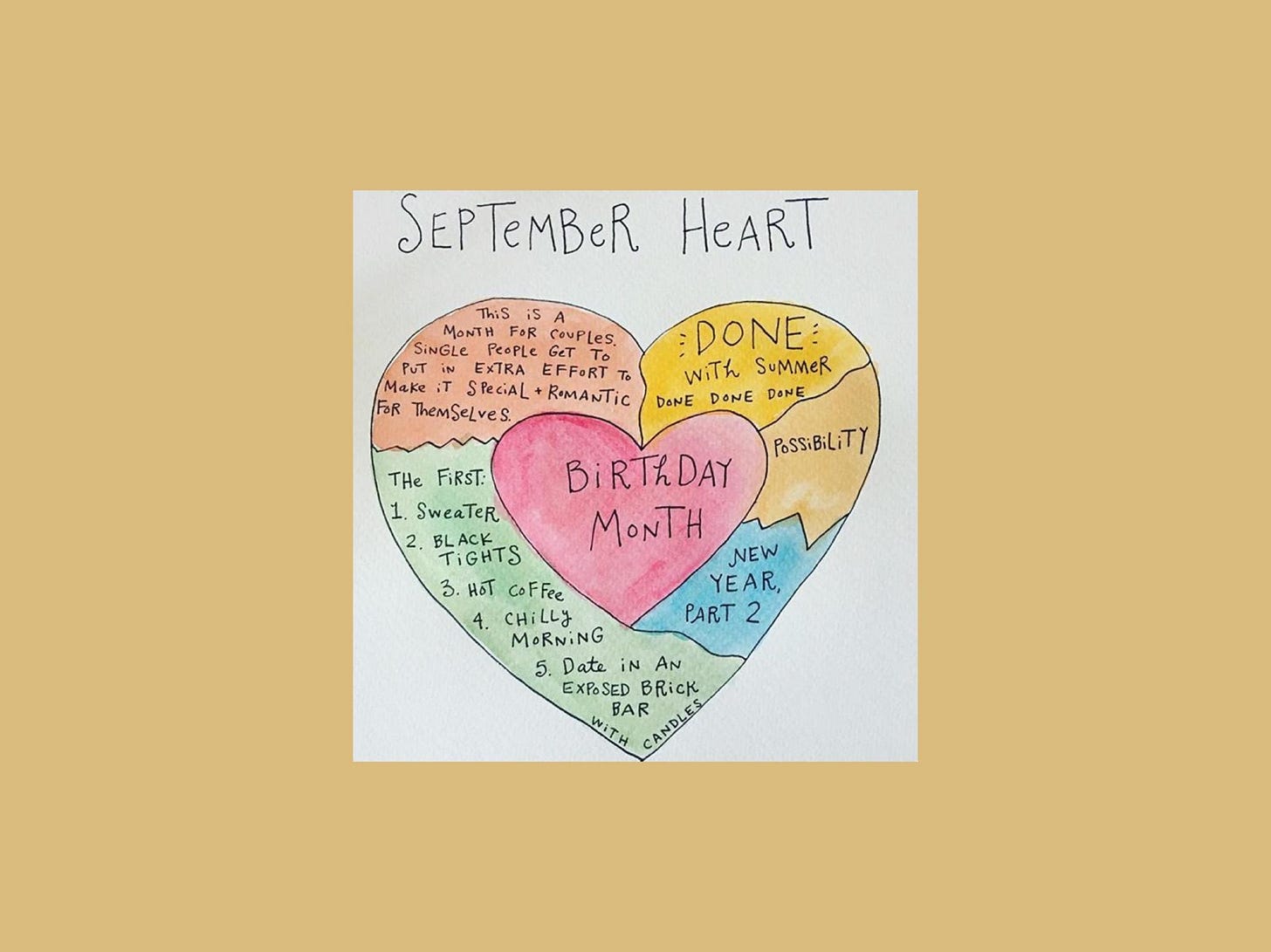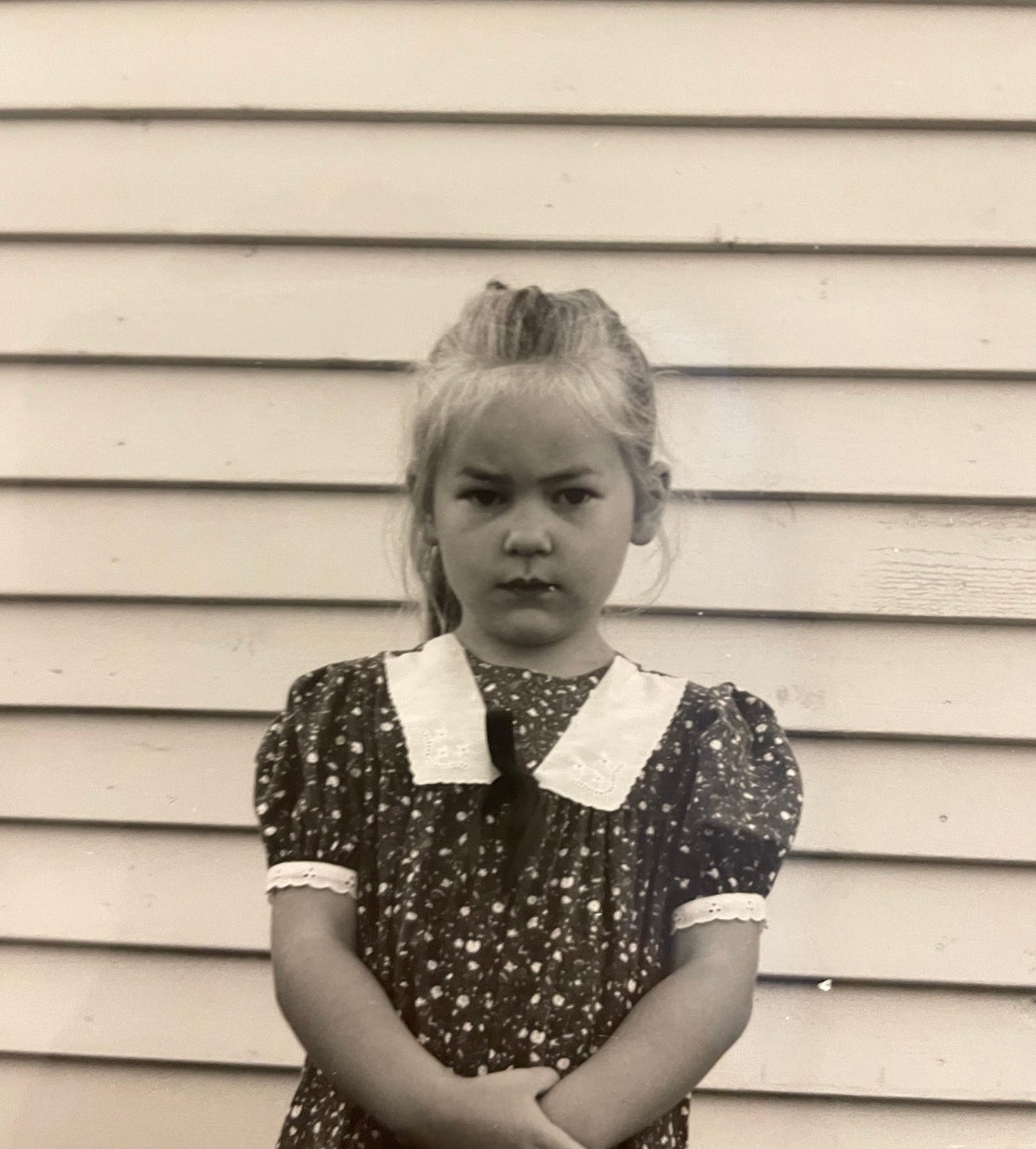In Awe of Aging
The ambiguous loss of getting older

It's Birthday Month in the Mari Household. Possibly in yours too? Apparently, September is the most common month for birthdays. While this interferes with my dream of being special, I like that these few weeks feel like an extended collective birthday season, the way each day in October crescendos to Halloween, and all of December is fair game for a Christmas sweater.
I love birthdays and feel an undercurrent of giddiness during International Birthday Season, but even I slip into over-pensiveness about the passage of time when I do my annual reflections on another year of life, in between bites of cake.
Recently, I heard a voicemail on a podcast where the caller was about to enter a new decade and she was feeling a bit trepidatious about the approaching milestone and a bit melancholy to be floating further from youth.
The podcast hosts responded that aging is a privilege, and life gets better every year, and youth is an overrated value we get straight from the patriarchy.
The response bugged me. It is indeed a gift to get older, but gratitude isn't an antidote to the overlapping feelings around age and time and beginning your own "years old" with a brand new number that once felt impossibly far away, an abstract concept belonging to mothers and teachers and dentists and presidents. Not you. Not now. It all went so fast.
It's not realistic that we wouldn’t feel some anxiety around the years passing. And not only because our society really supports a narrative that getting older is full of negatives (the messaging is slightly different across the gender spectrum but equally strong).
If you’re a remotely reflective person, you will most likely feel a sense of wistful loss as time passes, or even painful loss. And for those of us who were "born a little mournful," as Durga Chew-Bose put it, any marker of time is going to resurrect some ghosts.

Born a LITTLE mournful...
And, for the record, I've felt this way since I turned 8, when I suddenly missed being 7. It was so sad to think that I'd never be 7 again; that was my only shot at it. The melancholy around birthdays isn't a personal stigma against a particular age as much as the letting go of what's led up to this.
I've been reading a book about ambiguous loss, which discusses the many types of unresolved grief that we can feel in a lifetime. One category of ambiguous loss is physical absence with psychological presence, which occurs when someone you care about is absent under unknown, uncertain or unresolved circumstances. This could come in the form of a disappearance, or more commonly a divorce, or many other examples in which presence and absence mesh together into haunting.
Any time someone leaves without saying goodbye, it's ambiguous loss. And maybe that's why it can feel a little sad on a birthday, to welcome in a new year without a proper farewell to the old one.
At a wedding a few years ago, an old friend seated at my table asked, "Aren't weddings sad?" I laughed incredulously but he was right! I'd never thought about it in those exact terms, nor would I express them in those exact terms, for fear of being kicked out of the reception.
But yes; how else can we explain the popularity of Sunrise Sunset as a smash Broadway showtune hit, which is the ultimate mournful marital anthem?
How can an emotionally-charged, highly-mythologized ritual in which multiple generations of loved ones gather to witness the symbolic end of childhood (even if it happens several decades post-childhood) NOT have a twinge of sorrow to it??
We live in a world eager to rush the celebration, so we dismiss those pesky feelings of grief that interfere with the dancing. If anyone acknowledges, "It's sad to send my friend off to a new chapter of life," the party's over. We don't have a ritual to create space for those tough thoughts, and a bachelorette party doesn't count (unless you spent yours lighting candles in remembrance for your single life rather than riding around Nashville in a beer trolley or whatever).
Weddings mark the ambiguous loss of the single self, the independent self, the soulmate-searching self, among countless other selves.
Birthdays mark an even more ambiguous ambiguous loss: As I blast through my thirties, I feel homesick for selves I can't put my finger on. It's not about romanticizing the past or clinging to a specific definition of youth (every age sounds young to me, no matter the number), but about intimately knowing someone who will never return. I have embodied and deeply known my 12-year-old self, and she is gone.
There are guidelines for moving through ambiguous loss and easing its effects. One guideline is normalizing ambivalence. The phrase alone makes me smile; it brings to mind a protest poster reading NORMALIZE AMBIVALENCE!
That means I can appreciate the passage of time while it simultaneously warps my brain. It means I can cheerfully reflect on a truly lovely year gone by and dolefully acknowledge that pets, children, and parents are getting older right along with me. There's heartache in that.
It's rarely helpful to be met with "Be grateful!" when expressing ambilvanet feelings, particularly because gratitude is sort of a nebulous experience. What does it really feel like to be grateful?
It varies by individual, no doubt, but one definition on the Appreciation Scale (a thing that exists) is: the feeling of awe.
I love this adjustment. While gratitude sometimes evokes thoughts of kitschy hand-painted signs and warm-and-fuzzy positivity, I don't associate awe with happiness or sadness. I just know that it makes me feel small and amazed.
I'm in awe when I watch the construction workers across the street from me BUILD A WHOLE BUILDING, even though the noise is driving me nuts.
I'm in awe every time I turn on my shower and hot water comes out. I took a year's worth of cold showers in South America, and I'm still in awe that I can control water temperature. I'm more astounded than grateful: awe.
I'm in awe that my friend sent me a complicated birthday present: a box fan, a blow-up tent, and a lamp that projects stars: together these three objects create an inflatable dome where you can pretend you're looking at the night sky. This is because, in 8th grade, I was obsessed with my science teacher's 'star dome' where we sat in a tent pretending to look at stars. I'm in awe that she remembers. I'm in awe that I remember. I'm in awe that my 12-year-old self would be blown away by this gift, 24 years later.
I'm in awe that my dear friend lost her beloved son a couple years ago, and continues to take glowing joy in her life and share that joy with many others. I'm in awe that grief and glow can be such close companions. I'm in awe of how unfair her loss was. I'm in awe of how many questions we'll never get answers for in this life.
Awe seems to require the same amount of attention as gratitude does, but it feels more all-encompassing of everything that life is about, while leaving us to wonder what life is about.
And that's what I'm doing during this Birthday Week, when this year has been exceedingly simple, lovely, and charmed. I'm in awe that I'm in the best place I've ever been, and yet I still get jealous of everyone in my exercise class. Humans have such a grandiose capacity for ridiculousness, and for that I am in awe.
I hope to keep "Wow"ing and "Hmm"ing my way through life—what other way is there? I'm growing older, and it's sad and glorious and funky and puzzling. Wow. Hmm. Wow. Hmm. And so forth.
So, if you share this Birthday Season with me, may you release the pressure from podcasts and periphery to exist in a state of static gratitude as you turn an age you never thought you'd be.
Instead, may you be wide-eyed in awe:
that you came this far
that you endured this much
that you still get it wrong
that you figured that one thing out finally
that you are wrinkly
that you are loved
that you are very much here.
Hmm. Wow!
Welcome to Out of the Blue, a weekly reflection on something that's caught my attention, and an attempt to learn deep lessons from the shallow and light wisdom from the dark. If you haven't subscribed yet, sign up for free here!

